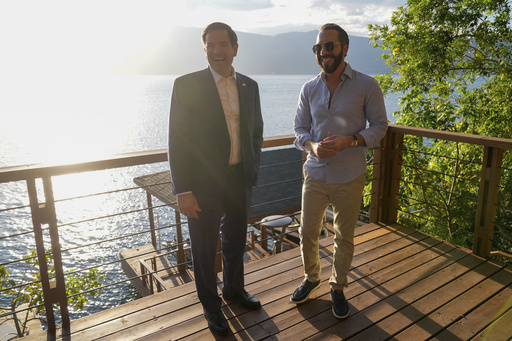
SAN SALVADOR, El Salvador — El Salvador has put forth a proposal to accept individuals deported from the United States for illegal entry, along with offering to accommodate some of the country’s violent criminals, including American citizens. This announcement follows a meeting between U.S. Secretary of State Marco Rubio and El Salvador’s President Nayib Bukele, with Rubio referring to the offer as “unprecedented” and “extraordinary” amidst ongoing global migration challenges.
Details surrounding this arrangement are limited, and there are concerns raised by immigration and constitutional specialists regarding its legality. Here’s a closer look at what the proposal entails:
### What Is El Salvador Offering?
President Bukele, who has been in office since 2019, claims that he is providing a potential solution for the overcrowded U.S. prison system. He expressed on social media platform X that El Salvador is open to “outsourcing” a segment of the U.S. inmate population, but highlighted that only those individuals convicted of crimes would be accepted. The financial aspect remains undisclosed, but Bukele assured that the cost would be “relatively low” for the United States while being significant enough to render El Salvador’s prison system sustainable.
### Where Would U.S. Criminals Be Housed?
The proposed location for housing U.S. criminals is a mega-prison that Bukele’s administration inaugurated in 2023, specifically designed to address issues related to MS-13 and other gangs. This facility, located approximately 45 miles southeast of San Salvador and dubbed CECOT (an acronym for “terrorism confinement center”), can accommodate up to 40,000 inmates in eight expansive pavilions. Each cell can hold up to 70 prisoners.
Human rights organizations have criticized the prison’s conditions as excessively harsh. Inmates reportedly have no access to visitors or outdoor time and receive just one meal a day. Unlike most correctional facilities, this prison does not provide educational or rehabilitation programs, with only occasional sessions for physical activity and motivational talks under strict surveillance. Recreational areas are reserved for prison staff, and officials state that released inmates would not reintegrate into their communities.
### Is This Even Legal?
While it is permissible to deport non-citizens to nations other than their own, the deportation of American citizens is likely illegal. According to U.S. immigration authorities, a country may accept a deported individual who is not a citizen of that country only if their original nation refuses to take them back. However, deportation generally pertains to those who have breached immigration laws, defined legally as “aliens.”
### What About American Citizens?
Naturalized U.S. citizens can theoretically face denaturalization under certain circumstances, such as fraudulent immigration applications or serious criminal activities like terrorism financing. Permanent residents (green card holders) may also face deportation if convicted of various offenses, including serious crimes. In contrast, natural-born U.S. citizens maintain their citizenship under the Fourteenth Amendment, which guarantees due process and equal protection, meaning that they cannot be deported, regardless of criminal behavior.
### Why is El Salvador Pursuing This?
El Salvador seeks to move forward from decades of civil conflict and the violence perpetuated by gang activity. Under Bukele’s leadership, the nation declared a state of emergency in 2022, which led to the suspension of constitutional rights and a crackdown on gang activities resulting in over 80,000 arrests. Despite a significant drop in crime rates and Bukele’s rising popularity, human rights advocates have raised alarms about unjust detentions and violations of due process.
### Has This Been Attempted Elsewhere?
While the United States and various countries have established agreements for handling migrants, an arrangement as unique as El Salvador’s proposed plan is unprecedented. The United Kingdom has a contentious agreement with Rwanda to relocate asylum seekers to the African nation, but it has faced legal hurdles. During his presidency, Donald Trump also orchestrated deals with Central American countries for U.S. asylum applicants, yet only Guatemala’s agreement was acted upon, which facilitated the transfer of more than 900 people who often continued seeking asylum elsewhere. President Joe Biden terminated these agreements in 2021.
### What Are the Next Steps?
Trump has expressed support for El Salvador’s offer, declaring it a significant deterrent, although he acknowledged potential legal challenges. “I’m just saying if we had a legal right to do it, I would do it in a heartbeat,” he remarked, implying that further exploration of the legal framework would be necessary.
Rubio, too, called the proposal by El Salvador “generous,” emphasizing the need for the Republican administration to assess the proposition before proceeding. He noted the importance of navigating the legal complexities involved.
Despite the uncertainties, Bukele capitalized on the attention from this initiative, humorously suggesting that El Salvador would even accept former U.S. Senator Bob Menendez, recently sentenced to prison, stating, “Yes, we’ll gladly take him in.”

